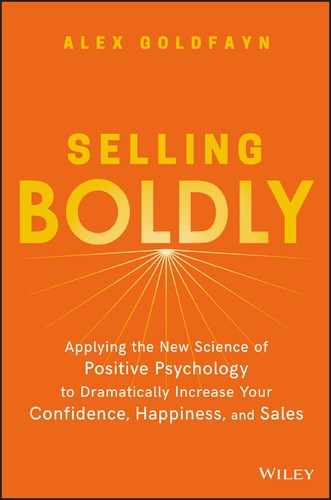8
Confidence versus Fear
The opposite of fear is confidence.
It should be no surprise that confident salespeople outsell fearful ones.
Confident humans outperform fearful ones. At work and also at life.
If you don't feel confident, talk to your happy customers, and ask them what their favorite things are about working with you. They will tell you. And it will be the absolute truth.
Confidence and fear are ways of thinking.
In the next chapter, we discuss boldness and meekness, which are the behavioral manifestations of these ways of thinking. That is, people who think confidently behave boldly, but people who think fearfully behave meekly.
So, how do confident salespeople think differently from fearful salespeople?
In almost every way.
But here are a few of the most important areas:
- The confident salesperson believes the customer is lucky to be hearing from her. The fearful one believes she is lucky the customer picked up the phone.
- The confident salesperson thinks it's highly likely he will get the business, because he is excellent, and the customer knows it. The fearful one thinks it's unlikely he will get the business. He is afraid he will not only miss out on this piece of business, but that the customer will fire him if he asks for the business at all.
- The confident salesperson believes the customer deserves to benefit from her great value, and that she owes it to the customer to offer him additional products, services, and value. But the fearful salesperson believes she is bothering the customer, and does not want to seem needy, or annoying, or pestering. As a consequence, she prefers to stay out of the way.
- The confident salesperson believes there are many additional ways he can help customers beyond what they are buying now. The fearful salesperson thinks that the customer will ask for it if they need to, and so tends to stay out of the way.
- The confident salesperson is driven to provide as much value to the customer as possible. The fearful salesperson's goal is to avoid being yelled at by the customer.
Where Confidence Comes From
Confidence comes from knowing how good you are and behaving accordingly.
Confidence comes from listening to your happy customers speak warmly and positively about you. I teach you how to do this in the next part of this book.
Confidence comes from both a history of success as well as experiencing quick early wins during a new pursuit.
That's one of the defining characteristics of the Selling Boldly program—the wins come quickly.
Twenty percent of did you know questions close and result in a new line item. We know this.
Similarly, 20 percent of quote follow‐ups, if implemented the way I lay out in Chapter 29 of this book, will work out successfully.
You will find that customers are quite happy to hear from you when you proactively call them.
Success leads to confidence.
You know what else leads to confidence? A plan!
Instead of bouncing around from one inquiry to the next, having a plan for some fast, simple proactive communications to customers and prospects each day—and then, actually executing on that plan—will give you great confidence.
Use the planners in this book to quickly create your plan.
Like the rest of these mindset shifts, confidence can be chosen and then further developed.
Choose confidence.
It pays better.
